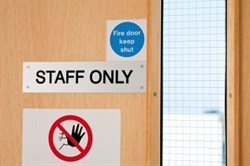
The Occupational Health and Safety Act 85 of 1993 ("OHSA") places a positive duty on employers to take measures and precautions to eliminate health and safety risks from arising in the workplace. The OHSA requires the measures to be "reasonably practicable" which means that measures taken must be proportional to the risk posed. It is unlawful for employees to demand the abolition of health and safety measures in general because of the duty to put such measures in place. It is not however unlawful for employees to challenge a particular measure if they consider it to be disproportional to the risk or insufficient to address such risk.
Employees can strike over "matters of mutual interest." These are matters which affect the employee at work and are not limited to issues regarding wages and conditions of service. Employees have an interest in their own health and safety and are affected by any measures taken in this respect. Health and safety obligations are bestowed upon both employees and employers and employees are therefore allowed to engage with employers regarding the mechanisms that have been put in place in the workplace and their suitability, or otherwise. As such health and safety measures are "matters of mutual interest" over which employees can collectively bargain and, even, strike.
In the case of Pikitup (SOC) Limited and SAMWU obo Members (J2630/13), the Labour Appeal Court determined the lawfulness of strike action against a particular health and safety measure. In this case, an employer had elected to unilaterally introduce mandatory breathalyser testing for safety purposes. The employees were opposed to the introduction of the measures arguing that they were inaccurate and invasive. The court found that there are several lawful means of testing employees for alcohol consumption; breathalyser testing was one of the most invasive of these measures. The employees' demand to abolish breathalyser testing was lawful because it was a challenge against the proportionality of the chosen method of testing weighed against the risk. It was not a demand which necessitated the employer breaking the law.
The court, in emphasising the importance of avoiding undue limitations on the right to strike, also found that because employees are affected by health and safety measures, such measures are "matters of mutual interest" over which employees can strike. They emphasised that although employers are primarily responsible for health and safety, mutual co-operation should always be sought when deciding on health and safety measures.
When deciding on health and safety measures, employers should consult employees and make use of collective bargaining to reach consensus on measures. Employers should be aware that if consensus fails, employees will be entitled to strike over the matter; provided their demands do not equate to compelling the employer to act unlawfully.